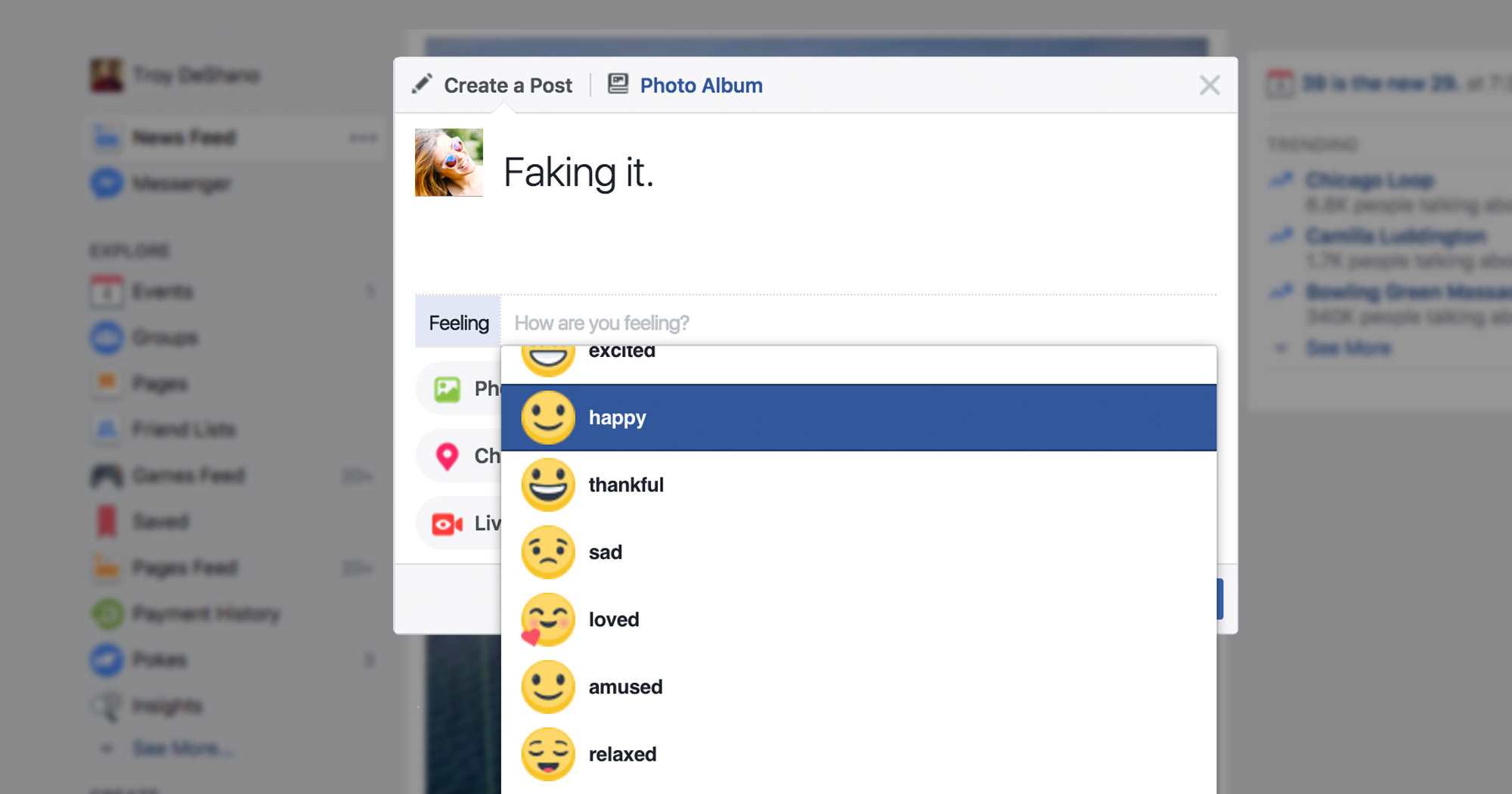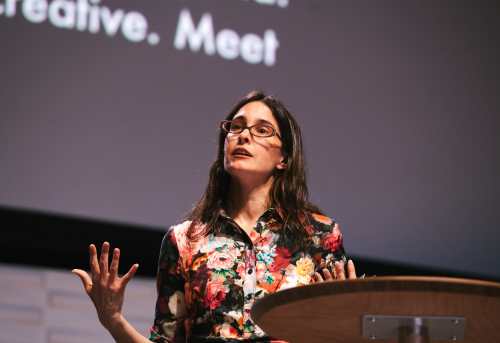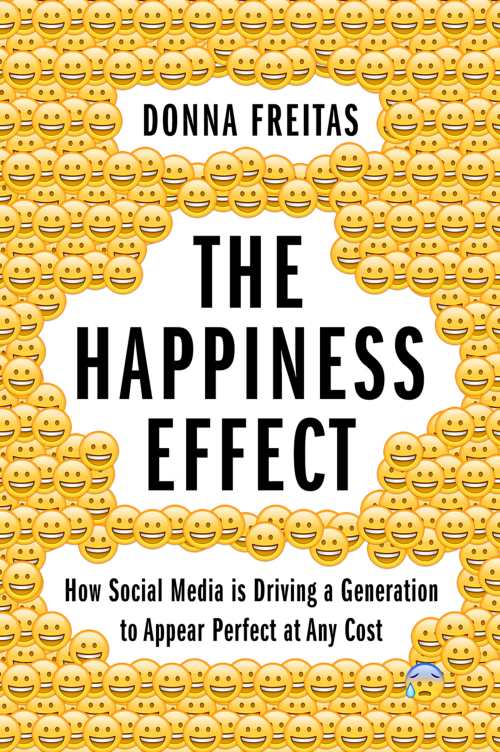Relationship Status: Faking Happiness

Do social media connect us, or result in distorted views of those we know? While conducting research for The Happiness Effect (Oxford University Press), Donna Freitas traveled the country talking to college students about their experiences with social media, and what she discovered is that they rarely, if ever, take the information that appears in a status or a tweet at face value. Facebook, Twitter, Instagram, and the rest are fraught territory—places where young adults feel pressured to project perfection, but where what’s shared rarely involves the unfiltered truth.
In her new book, Freitas compiles their perspectives on social media demands, and the resultant picture is fascinating. From anonymity to voyeurism, from caution on posts ranging from weekend activities to political perspectives, they paint a picture of a complicated, and demanding, online world. It’s enough to make a person put down their phone and try for old fashioned connections, already.
Donna Freitas, Author of The Happiness Effect
Does an upgraded Facebook relationship status qualify as a good Valentine’s Day gift?

Donna Freitas: 'We ... have created a situation where it is very difficult for young adults to be truly 'authentic' online.'

Gosh, I don’t know! I would say that, the students I spoke with were pretty cautious about their relationship status changes, and many chose never to update those. A lot of them actually commented on how shocked they were that their parents (if single) were so blatantly looking for dates online and/or posting about their private romantic lives.
What motivated you to undertake this research project?
For over a decade I’ve been doing research about life on college campuses, and spoken about this research at colleges and universities all over the country. I am constantly talking to and listening to young adults and college students talk about their lives and their questions and concerns. Because of that research and speaking, for a number of years I kept hearing college students express some really interesting opinions about how social media is changing the way they think about themselves and how it effects their relationships, or sense of place in the world (or lack thereof). But also, how much they wished to know what their peers thought about these things—if they were alone in their thinking, in other words, of if their peers shared the same sorts of identity, image, and relationship struggles, given social media.
During one particular trip I was visiting four or five different colleges and students could talk of nothing else but social media everywhere I went. When I got on a plane between two campus visits I wrote up a draft of what a study about social media and college students might look like. I decided that this research needed to happen because the students I was speaking to so deeply craved to know what their peers were experiencing now that social media has permeated our world so completely.
Are millennials finding ways to utilize social media platforms more authentically than just by constructing personas? What might that look like?
People are certainly constructing online personas—of this there is no doubt. Everyone I know does this. I would say that [the millennial] generation is the one that has had to contend with social media from a very early age—at least since middle school—so their young adult years have been defined by it, whether they like it or not. Also, they are the “test” generation—the social media “explorers,” as I named them in the book. They are navigating this largely unexplored, vast, and new terrain without the usual guidance and advice that the previous experience of their parents and mentors could have offered, because their parents and mentors are also exploring it and dealing with it the first time themselves.
I think that this generation is rather valiantly utilizing social media to the best of their ability—they truly want to find ways to be authentic on these platforms that have come to define so many people’s lives and so constantly, including their parents and teachers. Yet, for better or worse, we (parents, teachers, counselors, etc), because of our fears around the potential high stakes consequences of posting online, and the ways employers and college admissions officers have decided to use social media in order to judge potential students or employees, have created a situation where it is very difficult for young adults to be truly “authentic” online with anything attached to their names, because a single misstep might cost them their future (at least, this is the anxiety they’ve inherited and that we’ve passed on to them).
What is your personal relationship to social media?
I’m not on it—not really. I did have a Facebook for a long time but no longer do. I’m not very good with the willpower to resist, and I don’t like the experience of feeling so compelled to check every few minutes (just like the students reported! And like everyone else I know, who feels pretty highjacked by social media). Also, I’d rather know what’s going on with my friends when I see them in person—I’m old-fashioned this way, I guess. I do have a twitter account I created ages ago but literally never use. It’s floating out there somewhere.
But I am fascinated by social media obviously—and chose to do this study because the students I see all the time so desperately wanted someone to pay more attention to how social media is affecting their lives (and not only in the scandalous headline sort of way). In my other life, I write YA novels and I actually have a trilogy coming out with Harper Collins (the first book just came out last summer) that is influenced by the study, too, and all I learned from it. It’s called Unplugged.
Can you tell us a bit about your experience working with Oxford to bring The Happiness Effect to press?
I love working with my editor at Oxford, Theo Calderara. We worked together for my book Sex and the Soul, which is the one that has had me speaking on campuses all over the United States. It’s been an incredible experience. He is an amazing, amazing conversation partner and editor, and he brings out the best of me in my writing and in my reflections on the meaning and implications of my research.
What projects are you working on next?
Well, I’m finishing up my YA sci fi trilogy at Harper. The Body Market, the second book, comes out in March, and then The Mind Virus will be out some time later in the fall. My life has been pretty consumed by those books honestly. And then, I worked on a really interesting parenting study with Christian Smith, and he and I are going to work on a book together about that.

Michelle Anne Schingler is the managing editor at Foreword Reviews. Her presence on social media is blunt and political and otherwise everything that these college students know not to do. You can follow her on Twitter @mschingler or e-mail her at mschingler@forewordreviews.com.
Michelle Anne Schingler
